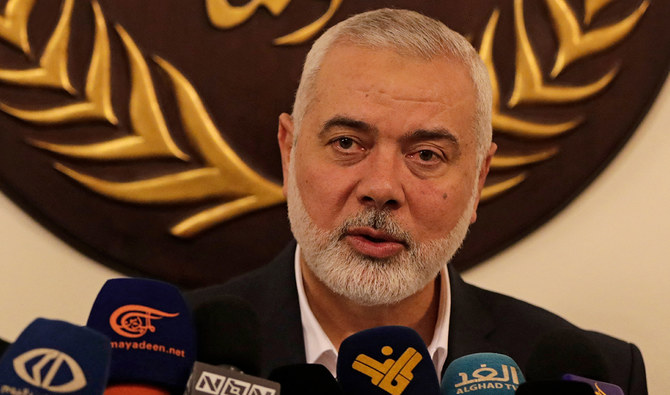ISLAMABAD: A prominent Palestinian politician and senior Hamas political leader, Ismail Haniyeh, sought Pakistan’s support to end Israel’s military offensive in Gaza on Wednesday, as UN Secretary-General Antonio Guterres invoked a rarely exercised power, asking the Security Council to demand an immediate end to the conflict.
Nearly 16,000 Palestinians have been killed since Hamas launched a surprise attack on Israel on Oct. 7, describing it as a response to the deteriorating condition of Palestinian people living under Israeli occupation.
According to the Israeli authorities, about 1,200 people lost their lives in Hamas’s incursion in which its operatives also took hundreds of hostages before returning to the Palestinian enclave.
In response, Israel launched massive airstrikes and a ground invasion in the Gaza Strip, targeting the Palestinian population. This offensive resulted in the destruction of hospitals and residential neighborhoods and led to a disproportionate loss of civilian lives, predominantly women and children. The scale and nature of these actions sparked global protests and led to accusations of war crimes against Israel.
“If Israel faced resistance from Pakistan, the perpetration of cruelty could cease,” Haniyeh told a conference at the Jinnah Convention Center in Islamabad through a video link, according to the Associated Press of Pakistan (APP) news report that was widely quoted by the local news organizations.
The Hamas leader, who is based in Qatar, addressed the event through a video link.
He criticized Israel for not implementing the Oslo Accords of 1993 which upheld the Palestinian right to self-determination and instead continued to build more settlements in the Occupied Territories.
Haniyeh also justified the Oct. 7 attack as a preemptive move against Israel’s plans for occupation.
ARTICLE 99 OF THE UN CHARTER
Meanwhile, the UN chief invoked Article 99 of the UN Charter, which says the secretary-general may inform the Security Council of matters that threaten international peace and security.
“The international community has a responsibility to use all its influence to prevent further escalation and end this [Israel-Hamas] crisis,” Guterres said.
He noted that about 80 percent of Gaza’s 2.3 million people had been forcibly displaced into increasingly smaller areas.
“Amid constant bombardment by the Israel Defense Forces, and without shelter or the essentials to survive, I expect public order to completely break down soon due to the desperate conditions, rendering even limited humanitarian assistance impossible,” he added.
A total collapse of the humanitarian system in Gaza, he continued, would have “potentially irreversible implications for Palestinians as a whole and for peace and security in the region.”
Despite mounting international outrage against Israel’s war on Gaza, the United States, Israel’s closest ally, has veto power in the Security Council and has not supported a cease-fire.
On Tuesday, US deputy ambassador Robert Wood told reporters that the role of the Security Council in the Israeli-Gaza war “is not to get in the way of this important diplomacy going on on the ground … because we have seen some results, although not as great results as we want to see.”
(With input from AP.)

















